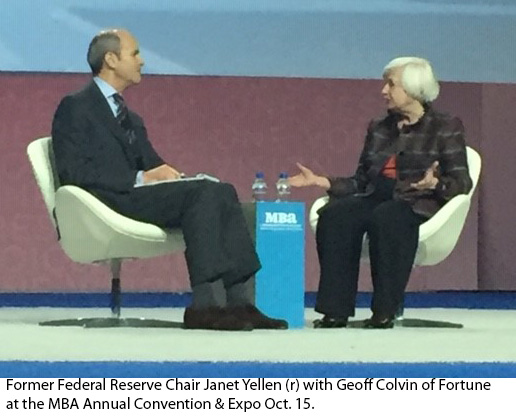
Former Fed Chair Yellen: Economic Performance ‘Excellent’
WASHINGTON, D.C.–U.S. economic performance is “excellent,” former Federal Reserve Chair Janet Yellen said here at the Mortgage Bankers Association’s Annual Convention & Expo.
“We have the lowest unemployment rate in 50 years and 3 percent [economic] growth,” Yellen told Fortune Magazine Senior Editor-at-Large Geoff Colvin during a general session. “At this point, everything looks terrific; we have a very strong economy. As I look forward, I certainly expect good times to last through 2019 at least.”
 Yellen noted some risks in the outlook. “Economic expansions usually do not die of old age,” she said. “There are two things that can make them die. The first is financial imbalances growing in the economy. The second is Fed tightening.”
Yellen noted some risks in the outlook. “Economic expansions usually do not die of old age,” she said. “There are two things that can make them die. The first is financial imbalances growing in the economy. The second is Fed tightening.”
Yellen said financial stability risk will not likely end this expansion. “Asset prices seem somewhat elevated, but on the other hand, interest rates are low and there are good prospects they will stay low,” she said. “If that [remains] the case, asset valuations look more normal.”
Yellen cautioned, however, she does worry about the economy overheating. “A 3.7 percent unemployment rate is a wonderfully tight labor market, [and the economy is] not seeing lot of inflationary pressure,” she said. “We do have to worry about inflation picking up over time. Three percent growth feels terrific. Unfortunately I don’t think it’s something that can last.”
The economy tends to grow at about 2 percent annually over the long run, Yellen said. “So, the Fed has a tricky task,” she said. “It has gradually raised rates and is shrinking its balance sheet. Now it needs to move to a neutral position where the labor market will stabilize”.
Yellen said in the 1970s, when the inflation rate was much higher, the public was not convinced the Fed was serious about fighting inflation. “So inflationary expectations picked up and firms granted wage increases,” she said. “But after several times that dynamic has been broken. If inflation picks up now, most people think, ‘it’s just temporary, the Fed will get it back to 2 percent,’ so it does not become a self-fulfilling prophecy.”
But Yellen cautioned that if unemployment declined to “exceptionally low levels,” that process could change and inflation could once again jump. “I don’t think it’s likely, but the Fed needs to be aware of it to ensure it doesn’t happen,” she said.
Yellen cited an inverted yield curve as one of the better signals of a coming recession. “Many people are focusing on it,” she said. “I do think there is a reasonable chance that the yield curve may invert as the Fed raises monetary policy.” She noted long-term interest rates embed two things: first, market expectations of short-term rates over a 10-year period; and second, a “term premium,” or the extra return investors want to commit to an investment that lasts for multiple years.
“That term, ‘premium,’ has usually been positive and sometimes pretty large, so when the yield curve inverts, it really means the Fed has raised short-term rates well above the normal level of short-term rates, so monetary policy is quite tight,” Yellen said. “I do think this time is different. It won’t be my judgment, but if I were at the Fed this is something the Fed should never do to cause a recession.”
Yellen also dismissed criticism by President Donald Trump, who has publicly questioned whether the Fed should continue to raise the federal funds rate. “I do think the Fed has a strong reputation for acting in an independent and non-political way,” she said. “I would not like to see that reputation damaged.”
